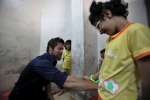- Text size
 |
|  |
|  |
| 
- Français
UNHCR and partners distribute aid to Lebanese, Syrians displaced by clashes in Bekaa Valley
Briefing Notes, 8 August 2014
This is a summary of what was said by UNHCR spokesperson Ariane Rummery – to whom quoted text may be attributed – at the press briefing, on 8 August 2014, at the Palais des Nations in Geneva.
UNHCR, working with Lebanese government and other partners in the north-eastern Bekaa Valley, is distributing humanitarian supplies, including hygiene and baby kits, mattresses, blankets, bread and canned food, to Lebanese civilians and Syrian refugees who have fled fighting between the military and armed groups in the town of Arsal, close to the Syrian border.
Lebanese municipal authorities estimate that over 2,000 Lebanese and Syrian people, mainly women and children, have fled Arsal since the clashes began on Saturday. They are currently sheltering in private houses, community centres and schools in Bekaa towns such as Al Marj, Bar Elias and Baalbek.
With movement into and within Arsal still curtailed by the security situation, access remains limited and reports indicate that food stocks and baby supplies are running low. Electricity remains cut off, preventing pumping of water from wells, and the water supply is precarious. However, two water trucks were able to deliver water on Wednesday to various homes and collective shelters in the town.
Reports indicate that health-care centres in Arsal are running low on medical supplies. Primary care and mobile medical unit activities have mostly been suspended, with only one primary care centre open to receive patients. Humanitarian agencies have dispatched mobile medical units to areas and towns in the Bekaa hosting those displaced from Arsal.
Those who were able to flee the town cite security concerns, including the risk of being caught in the crossfire, as the main reason for leaving their homes. Some 35,000 Lebanese civilians live in Arsal, while in the same town UNHCR has registered 42,000 Syrian refugees who fled from the conflict in neighbouring Syria, now well into its fourth year.
Lebanon currently hosts more Syrian refugees than any other country, with UNHCR having registered 1.2 million, equivalent to over 25 per cent of Lebanon's resident population. Most of these registered refugees, over 400,000, are in the Bekaa Valley.
For more information on this topic, please contact:
- In Geneva, Ariane Rummery on mobile +41 79 200 7617
- In Lebanon, Brian Hansford on mobile +961 763 206 25






































